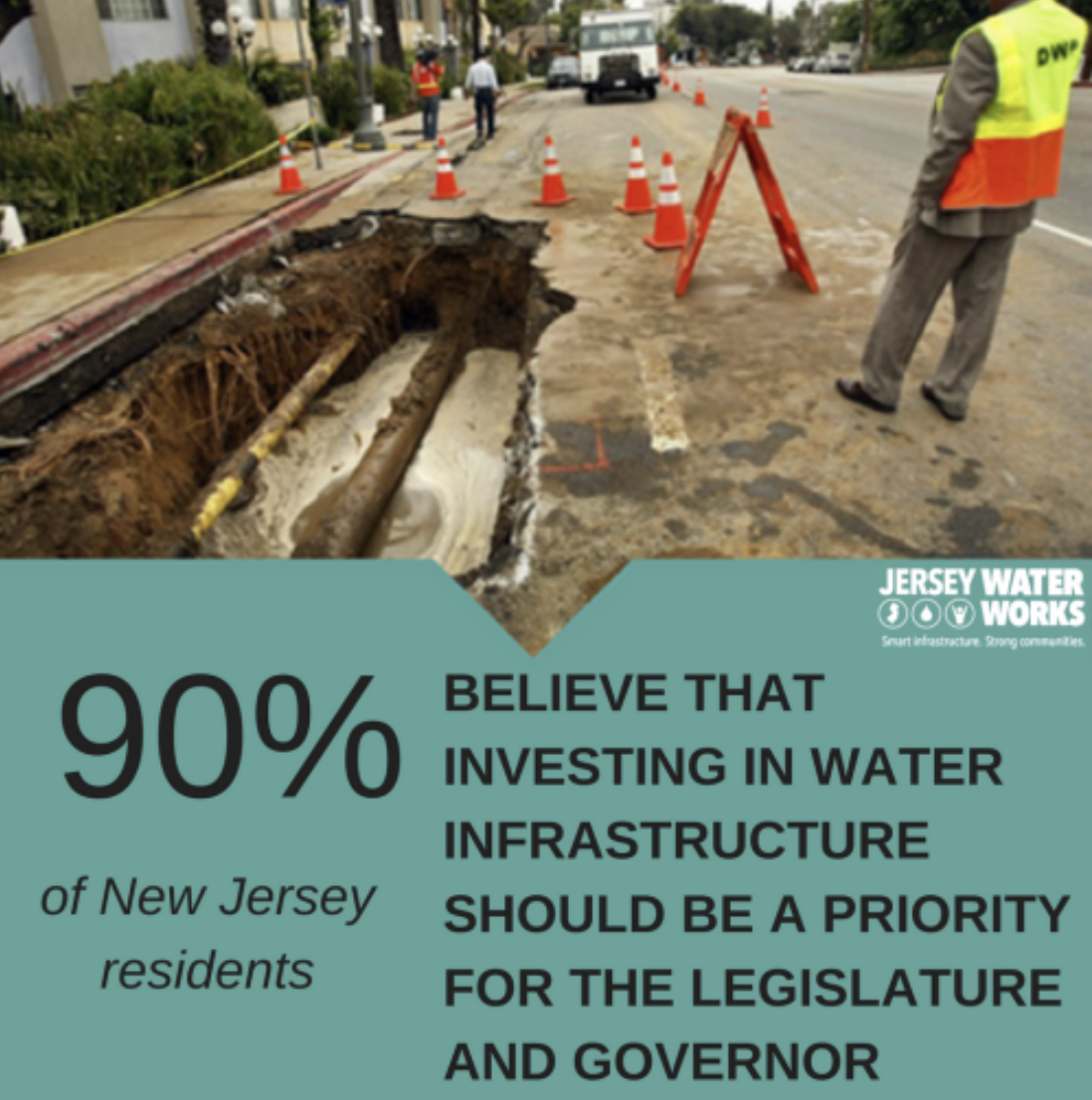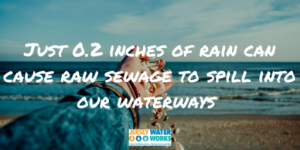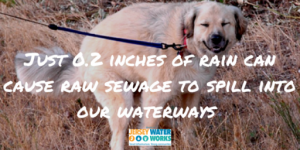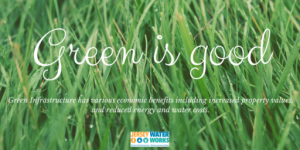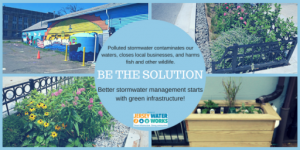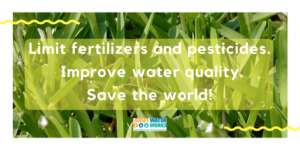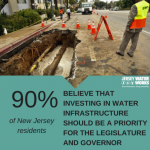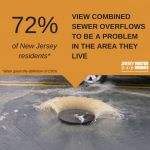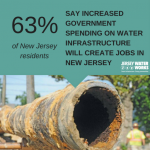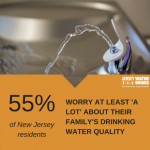The Jersey Water Works Community Engagement Committee has compiled memes, posts and tweets that can be used to help you raise awareness about combined-sewer overflow pollution, flooding, runoff and the need for water infrastructure investment. Our goal is to engage stakeholders and the public in water infrastructure issues.
Use these posts, tweets and memes strategically on days like “Imagine a Day without Water” to educate the public on water infrastructure issues. We recommend that you always include images and appropriate hashtags with all of your social media posts to increase engagement.
For posting times, organizations should follow what works best as a result of your own internal analytics, but in general: Facebook: weekdays, especially Thursdays and Fridays in the midday hours between 12pm and 3pm. Twitter: weekdays around lunch and after work hours, multiple times a day. Instagram: weekdays after work hours. Many social media management platforms, such as Tweetdeck and Buffer, will allow you to schedule these in advance.
Help people connect the dots during heavy rainstorms with posts that highlight the connection between our aging water infrastructure and flooding, and keep the discussion going on the need to invest in our water infrastructure.
We’ve also included a list of annual events, both national and international, around which we can organize our efforts.
MEMES
Infrastructure:
Combined-sewer overflow pollution:
Green infrastructure:
Personal actions:
Highlights from Community Survey:
SUGGESTED TWEETS
- Infrastructure
- Culprits of many sewer main breaks are pipes pushing 100 years old! #InvestNJWaterInfrastructure
- NJ’s old water infrastructure needs a major overhaul. Learn why here.
- Flooding
- How was your commute today? #NJFlooding [Tweet on heavy rain day]
- Tell us: Where does it flood in your neighborhood?
- Twitter poll: How often does your property flood? [Multiple choice answers: never, 1-3 times a year, 5-7 times a year, every time it rains.]
- CSOs and Pollution
- Just 0.2 inches of rain can cause combined sewer overflows, aka raw sewage in our waterways! #ConserveH2O during heavy rain
- Check out this short film on stormwater pollution and #greeninfrastructure #GreenerIsBetter
- Infrastructure Investment
- NJ’s water infrastructure needs $25B in upgrades over the next 20 years. What can be done? Find out: https://jerseywaterworks.3lanemarketing.com/
- Green Infrastructure
- Manage stormwater by mimicking our natural water cycle! #NJGreenInfrastructure [tweet GI image in action]
- Did you know #rainbarrels at your home can improve water quality? http://www.water.rutgers.edu/Stormwater_Management/rainbarrels.html
- #GreenInfrastructure has various economic benefits, including increased property values and reduced energy and water costs. #GreenIsGood
- The old way: Channel precipitation into storm drains to take away. The new way to treat precious rain: Keep it on site and get it in the ground.
- Better #stormwatermanagement starts with #greeninfrastructure! Learn more http://www.water.rutgers.edu/GreenInfrastructureGuidanceManual.html #greenisgood
- Personal Actions
- Help out NJ’s stormwater infrastructure by conserving water during heavy rain! #NJWaterInfrastructure
- Do you love a green lawn and safe-to-drink water? Limiting fertilizers, pesticides improves water quality #savetheworld
SUGGESTED FACEBOOK POSTS
(Always include images and appropriate hashtags with all of your social media posts to increase engagement.)
- CSOs
- Many of NJ’s cities rely on combined sewer systems — systems in which stormwater runoff from city streets feeds into sewer lines and is treated, along with sewage, by treatment plants. Some of these systems are more than 100 years old and in heavy rain events the sewage drains directly into rivers!
- Runoff
- Stormwater brings pollutants and bacteria along for the ride to our waterways. Nutrient pollution in our local waterways can cause excessive algae growth that can kill fish! You can be waterway-friendly by simply using safer fertilizers. Click here for recommendations: http://www.stjohnsriverkeeper.org/river-friendly/fertilizing/
- When it rains, water flows from roofs, sidewalks and parking lots, picking up everything from oil to pesticides to litter. In many NJ cities, this flows untreated into nearby waterways. This is called stormwater runoff, and it’s one of the largest sources of water pollution. #GreenIsGood https://vimeo.com/52018694
- Polluted stormwater contaminates our waters, closes local businesses, and harms fish and other wildlife. As stormwater passes over developed land, it picks up pollutants and transports them to the nearest storm drain – and these are connected to local waterways. To reduce stormwater runoff, use environmentally safe fertilizers.
- Flooding
- Unable to soak into the ground, urban stormwater runoff quickly transforms into flooding, causing traffic backups, property damage, habitat harm and even school closures.
- Lack of drainage causes coastal flooding.
- Green Infrastructure
- Tired of rainy days with not a pervious surface in sight? Better #stormwatermanagement starts with #greeninfrastructure! Learn more here: http://www.water.rutgers.edu/GreenInfrastructureGuidanceManual.html #GreenerIsBetter #NJWater
- Be part of your city’s CSO solution: keep stormwater (rain and snow) on site. #waterisprecious #NJWater
- At least 23 BILLION gallons of untreated raw sewage is discharged into New Jersey’s waterways each year due to Combined Sewer Systems in older cities. #GreenInfrastructure can be part of the solution to reduce the volume of water entering the sewer system. Learn more: http://www.patersonsmart.org/#!green-infrastructure/srdpx #GreenIsGood
- Pervious surfaces let stormwater soak into the ground instead of running off into streets and contributing to polluted flooding and CSO backups. #NJFlooding #NJWater
- Personal Actions
- There are easy ways YOU can help reduce the stress on your city’s sewers. One is to avoid using your washing machine, flushing toilets, and showering during heavy rainfall.
- What do you love more – a bright green lawn or safe-to-drink water? Limit fertilizers and pesticides, improve water quality, save the world! #greenisgood.
- Shave. Conserve. #StormwaterManagement #JerseyWaterWorks #NJWater
MONTHLY WATER-RELATED EVENTS CALENDAR
February
March
- World Water Day
- Earth Hour
- International Day of Action for Rivers
April
May
June
September
October
November
December
